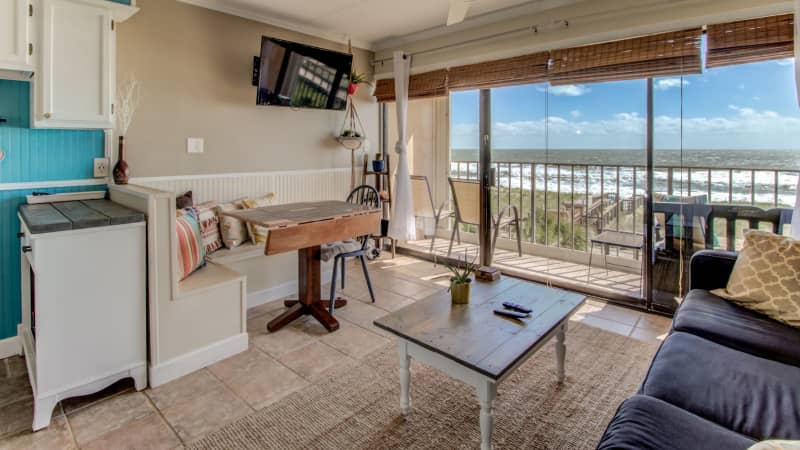(CNN) — With coronavirus spreading across the globe, thousands of travelers have called off plans for vacations, work trips and family visits.
As Airbnb has expanded its cancellation policies related to the Covid-19 pandemic, hosts like White have lost a significant source of income.
The reimbursements are funded by Airbnb, and will go to hosts with qualifying cancellations, paying 25% of what they would normally receive from a canceled booking.
The best quarantine experience of your life?

It’s a great view from Richard White’s rental condo at Carolina Beach.
Jen Rose Smith
Confronting the sudden and still significant income loss, some hosts are working to accommodate the changing face of travel during coronavirus. Even as more states issue stay-at-home orders, they’re tweaking listings with a speed that showcases just how nimble the gig economy can be.
Those coronavirus-ready listings reflect the varied ways small businesses are reacting to news of the global pandemic.
Others saw an opportunity to offer well-appointed getaways for guests looking to self-quarantine in comfort.
“Escape from the boring and change up your environment to have the best quarantine experience of your life,” wrote a host in Cathedral City, California, in a listing inviting guests to “quarantine in style for 50% off.” (The listing has been changed to be more generic.)
A 5-bedroom house located near Palm Springs, the now-discounted listing offers optional perks including a grocery-delivery service, private yoga classes, a private chef and private massage. The California property also highlights an enhanced cleaning protocol, which now makes use of an alcohol-based disinfectant.
Along with photos of two bedrooms and two fold-out sofas, the listing features official-looking checklists touting “Medical Grade Decontamination,” and cleaning protocols reflecting CDC recommendations.
Where the gig economy meets local bans

The Carolina Beach city council has banned short-term vacation rentals in light of coronavirus.
Jen Rose Smith
But even the gig-economy hustle of short-term rental hosts can’t overcome local rulings banning short-term rentals altogether.
“The town made the right call in shutting down the rentals,” says White. “Our feeling from the beginning was that everyone should be isolating, and staying at home and staying in place on their own to help, and that’s what we’ve been doing.”
Even so, White faces a major income loss. And Carolina Beach Mayor LeAnn Pierce understands the challenges faced by owners of vacation rentals as the community closes its doors.
As Pierce watched news of the spreading coronavirus, though, she was concerned by a surge of phone calls she received from people from across the country deciding they’d rather quarantine at the beach.
“My council believes that the only way to defeat the virus is to flatten the curve, and we’re following the CDC guidelines,” says Pierce. “We’re 6,500 year-round people in our community, and in the summertime we get 30-40,000. We can’t manage that number of people in a pandemic.”
‘We ask you to respect our community’
Carolina Beach isn’t the only vacation destination hoping to stem the flow of outsiders. Recent days have seen a series of bans and recommendations that are disrupting the ability of short-term rental owners to bring in income.
The desert communities of Palm Springs and Rancho Mirage, popular as getaways for vacationers from Los Angeles, made similar decisions.
“Residents of other communities need to stay at home where they live,” said Palm Springs Mayor Geoff Kors in his statement, “so as not to add to the spread of the virus in the Coachella Valley, endangering our residents, frontline workers and local healthcare system.”
The economic impact on short-term rental hosts
Richard White, the Carolina Beach rental host, works in the film industry, but the rent from his four rental condos is key to his livelihood. In 2018, he says, rentals provided the bulk of his income.
“We’re in a situation where the film job I had shut down,” says White. “And now the rentals are all shut down.”
Like White, many Airbnb hosts are wondering how to cope with the unexpected shortfall, which could be significant.
The loss of that income could strain already-tight budgets. In a recent survey conducted by Airbnb, 53% of responding hosts said short-term rental income helped them stay in their homes; 49% said they host on Airbnb to make ends meet.
“Right now, none of us knows what the future holds,” says White. “There’s a misconception that Airbnb hosts are these big businesses. But we’re just regular people trying to make a living.”
A $250 million relief fund
Bookings with check-in dates from March 14 through May 31 qualify for the special reimbursement, as long as the reservation was canceled due to coronavirus.
The policy applies retroactively, and payments will be issued starting in April.
Guests benefit from the updated policies, as well. Airbnb is extending penalty-free cancellations through May 31 for bookings made before March 14. (A previous policy extended to April 14.)
The company hopes the changes will help repair damaged relationships with hosts following several chaotic weeks in the travel industry.
“We have heard from you and we know we could have been better partners,” wrote Airbnb CEO Brian Chesky in a letter to hosts released on March 30. “What you need are actions from us to help, not just words.”
